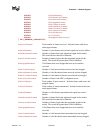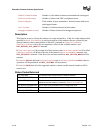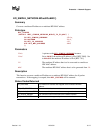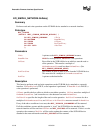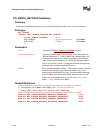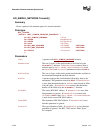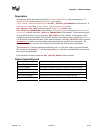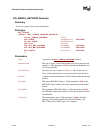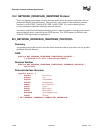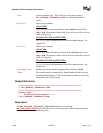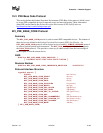
Protocols — Network Support
Version 1.10 12/01/02 15-23
Description
This function places the packet specified by Header and Buffer on the transmit queue. If
HeaderSize is nonzero and HeaderSize is not equal to
This->Mode->MediaHeaderSize, then EFI_INVALID_PARAMETER will be returned. If
BufferSize is less than This->Mode->MediaHeaderSize, then
EFI_BUFFER_TOO_SMALL will be returned. If Buffer is NULL, then
EFI_INVALID_PARAMETER will be returned. If HeaderSize is nonzero and DestAddr or
Protocol is NULL, then EFI_INVALID_PARAMETER will be returned. If the transmit engine
of the network interface is busy, then EFI_NOT_READY will be returned. If this packet can be
accepted by the transmit engine of the network interface, the packet contents specified by Buffer
will be placed on the transmit queue of the network interface, and EFI_SUCCESS will be returned.
GetStatus()
can be used to determine when the packet has actually been transmitted. The
contents of the Buffer must not be modified until the packet has actually been transmitted.
The Transmit() function performs nonblocking I/O. A caller who wants to perform blocking
I/O, should call Transmit(), and then GetStatus() until the transmitted buffer shows up in
the recycled transmit buffer.
If the driver has not been initialized, EFI_DEVICE_ERROR will be returned.
Status Codes Returned
EFI_SUCCESS The packet was placed on the transmit queue.
EFI_NOT_STARTED The network interface has not been started.
EFI_NOT_READY The network interface is too busy to accept this transmit request.
EFI_BUFFER_TOO_SMALL
The
BufferSize parameter is too small.
EFI_INVALID_PARAMETER One or more of the parameters has an unsupported value.
EFI_DEVICE_ERROR The command could not be sent to the network interface.
EFI_UNSUPPORTED This function is not supported by the network interface.



